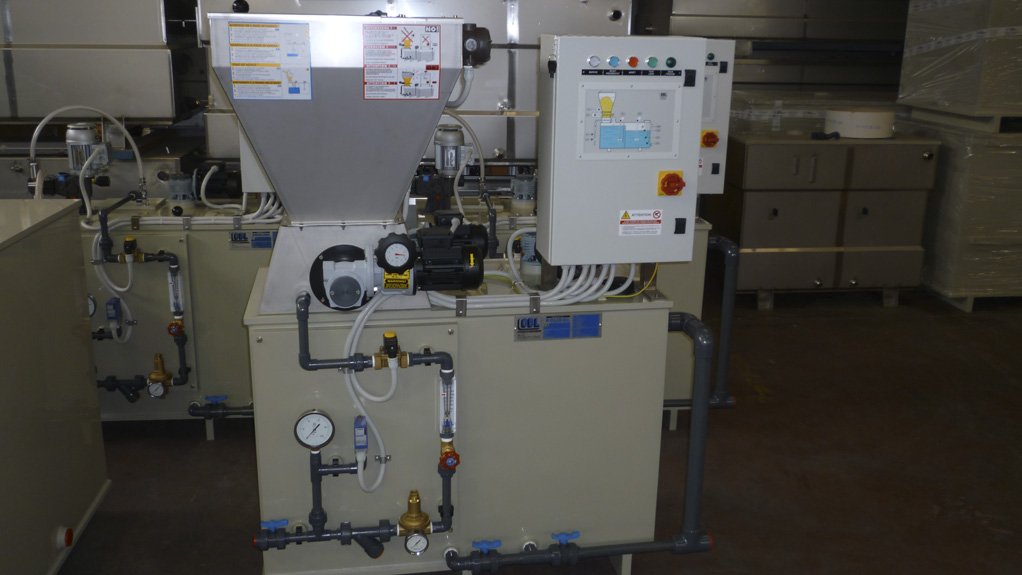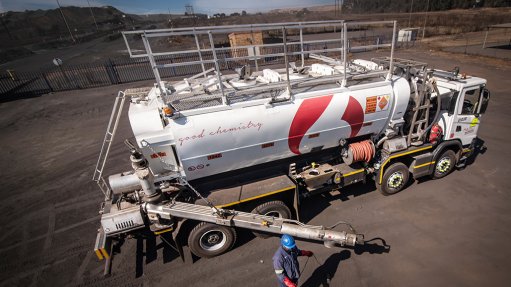Company offers complete solution for water treatment works


POLISOL POLYMER PLANT There’s a gap in the market for small-scale dosing equipment that can be custom-made for a client’s applications
Chemical dosing and pumps solutions supplier Packaged Metering & Pumping Solutions (PMPS) says its Polisol automatic polymer preparation plant unit, from Italy-based metering pumps manufacturer OBL, can cater for companies that need small-scale dosing equipment.
With many water treatment works refurbishing existing water treatment builds and requiring additional treatment equipment and effluent plants to upgrade their infrastructure, PMPS can supply complete polymer plants or components.
Added to its portfolio range earlier this year, the Polisol system comprises automatic plants for continuous preparation of dosing dry polymer, used to prepare and mature dry polymer beads or powder by dissolving it into water to form a consistent concentration of polymer solution. This solution assists in aggregating small suspended particles to form a floc for easier settling out or filtration of solids.
The system can be used with any existing water and wastewater treatment infrastructure or on its own in the waterworks industry.
PMPS technical director David O’Neill says the company has been supplying OBL components since 2007, but PMPS is evolving into assembling and supplying complete systems, rather than selling components.
PMPS will start Polisol system trials at the end of the year at a local waterworks plant in Gauteng.
“There’s a gap in the market for . . . small-scale dosing equipment that can be custom-made for a client’s applications. Normally, companies involved in waterworks are civil companies or original- equipment manufacturers that build civil structures, like clarifiers, and cater for more for large-scale applications.”
The Polisol system can also be used in the pulp and paper industry to dose polymers to aid in compacting solids.
The Process
At a sewage treatment plant, water is treated with chemicals and is subjected to aerobic or anaerobic phases, which is biological processing using bacteria. Subsequently, the water contains a lot of small suspended particles, or solids, and then flows through the clarifier, which would then settle out the solids.
However, O’Neill explains that the poly- mer plant can bring the solids together to form larger particles that will settle and sink to the bottom of the clarifier.
“The dosing rate is different, depending on the quality of the water, as dirtier water requires more chemicals to be added beforehand.”
The polymer plant aids in the removal of a large portion of the solids, through clarification, depending on the quality of the water, but the water is still subjected to a filtration process afterwards to remove the rest of the particles.
“Big particles are first settled out, then smaller particles are filtered out.”
O’Neill concludes that the company is confident that its skills and service capability will enable it to provide the required service once the trials have been completed.
Article Enquiry
Email Article
Save Article
Feedback
To advertise email advertising@creamermedia.co.za or click here
Press Office
Announcements
What's On
Subscribe to improve your user experience...
Option 1 (equivalent of R125 a month):
Receive a weekly copy of Creamer Media's Engineering News & Mining Weekly magazine
(print copy for those in South Africa and e-magazine for those outside of South Africa)
Receive daily email newsletters
Access to full search results
Access archive of magazine back copies
Access to Projects in Progress
Access to ONE Research Report of your choice in PDF format
Option 2 (equivalent of R375 a month):
All benefits from Option 1
PLUS
Access to Creamer Media's Research Channel Africa for ALL Research Reports, in PDF format, on various industrial and mining sectors
including Electricity; Water; Energy Transition; Hydrogen; Roads, Rail and Ports; Coal; Gold; Platinum; Battery Metals; etc.
Already a subscriber?
Forgotten your password?
Receive weekly copy of Creamer Media's Engineering News & Mining Weekly magazine (print copy for those in South Africa and e-magazine for those outside of South Africa)
➕
Recieve daily email newsletters
➕
Access to full search results
➕
Access archive of magazine back copies
➕
Access to Projects in Progress
➕
Access to ONE Research Report of your choice in PDF format
RESEARCH CHANNEL AFRICA
R4500 (equivalent of R375 a month)
SUBSCRIBEAll benefits from Option 1
➕
Access to Creamer Media's Research Channel Africa for ALL Research Reports on various industrial and mining sectors, in PDF format, including on:
Electricity
➕
Water
➕
Energy Transition
➕
Hydrogen
➕
Roads, Rail and Ports
➕
Coal
➕
Gold
➕
Platinum
➕
Battery Metals
➕
etc.
Receive all benefits from Option 1 or Option 2 delivered to numerous people at your company
➕
Multiple User names and Passwords for simultaneous log-ins
➕
Intranet integration access to all in your organisation



















